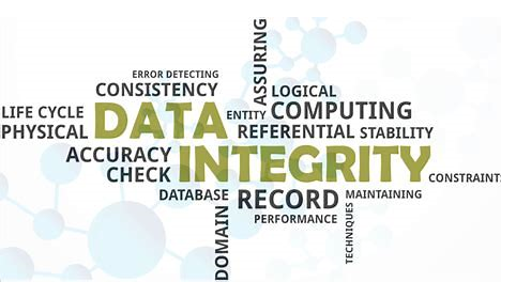Backbone of IS: Role of Data Validation & Integrity
Organization success these days are heavily influenced by the integrity and accuracy of data in the dynamic field of information management. Databases play a pivotal role as a source of knowledge for any organization, especially since we are moving to a bigger and more complex digital era. Databases can be seen as a vital digital storage that stores and manages crucial information. Data validation and integrity is a safety net for any database to ensure accuracy, integrity and reliability of a data. (Michael S., 2023)
Data validation is essentially the process of ensuring that the inputted data meets the required standards and criteria. While data integrity ensures that the quality of data remains unchanged and retained overtime. (Zana A. K., 2023) Both concepts are closely related with different purposes, but collaborate with one another in a database. When both of them are collaborating they will ensure: Consistency ensures that the data are all uniform with one another with the same entity. Accuracy of data ensures that all data are correct and suitable for use. Reliability of data means that data is ready to be used for crucial decision making, reporting and strategy development in the future.

Common data quality problems that occured due to the absence of data validation and integrity. Here are some common problems that are most likely to happen:
- Inconsistent data: Inconsistency in spelling and writing format can lead to difficulties in unifying data.
- Duplicated data: Causes redundancy, wasting resources and storage.
- Incomplete data: Ineffective decision making and missed business opportunities.
- Outdated data: Failure to update required data causes future financial losses, incorrect invoicing and many more

These common risks are just some examples from many other potential risks and threats that happen without the help of data validation and data integrity when managing a database.
Those problems will cause massive disturbance for any company, especially in the long run.
For starters organizations will undergo massive financial losses, imagine multiple inaccurate financial data, from sales data to inventory counts, all of those things will flawed the decision making process for budgeting and planning. Decreased productivity due to misorganized and poor data quality will hinder workflow and overall efficiency of daily work activities. Another worst case scenario is the damage to the reputation of the company from the customer’s point of view. Poor data quality will lead to miscommunication between companies and their customers, by giving inaccurate information or even promoting outdated promotions. Not only will this decrease the trust of customers to the company, but they will be more likely to move on to competitors, and even worse they could give bad comments to make potential customers not interested in doing business.
That is why data validation and integrity is crucial in a company that has high-level data. Ensuring good security and data validation management is as important as obtaining good quality data. Here are important validation method to keep in mind:
- Access control: Granting and revoking database access is essential. Granting access to trusted and right people/department, and revoking access to unwanted or past employees. This will make sure unautharized individuals won’t have access to tamper any valuable data.
SQL Database:
GRANT ALL ON MsCustomer TO MarketingStaff
(In this SQL the admin grants access for Marketing Staff to Update, Insert and Delete any data about Customer).
REVOKE ALL ON MsCustomer FROM MilesEdward
(Imagine Miles Edward is a past Marketing employee that is fired due to unprofessional behaviour. To prevent Miles from sabotaging his previous company’s data the admin has to revoke all of his access.)
- Database Constraints: Validation and requirements that must be followed while inputting new data.
- Primary Key Constraint: Is the key that uniquely identifies a table, this key will ensure that data is NOT NULL and is unique.
- Foreign Key Constraint: Links tables that are related, while maintaining data integrity.
- Check Constraint: As from the name the constraint will ‘check’ if the data is inserted following the requirments that are added.
- Not Null Constraint: Ensuring that column isn’t NULL and has a value.
Example:
CREATE TABLE MarketingStaff (
StaffID CHAR(5) PRIMARY KEY,
StaffName VARCHAR(70) NOT NULL,
StaffAge INT CHECK (StaffAge >= 18) NOT NULL
);
CREATE TABLE Property(
PropertyNo CHAR(5) PRIMARY KEY,
StaffID CHAR(5) ,
FOREIGN KEY (StaffID) REFERENCES MarketingStaff(StaffID)
With all of this information in mind, user training and awareness is a necessity for any company. All employees have to know the improtance of data validation and integrity to achieve the highest rate of data quality. Train employees on how to insert and maintain data in their every day work. So in conclusion data validation and integrity is an important element that is needed in any database system. Both of them can be called the basis of a database system, without them getting high quality data will be a near impossible mission to accomplish.
References:
Abhijeet, K (N/A). Why is data validation crucial for long-term data success
Edward, S (2017) Database Design and Implementation. Springer
Oracle (N/A) Controlling Database Access
https://docs.oracle.com/cd/B10500_01/server.920/a96524/c23acces.htm
Sebastian, T (N/A) Data Validation The process of ensuring the accuracy and quality of data
https://corporatefinanceinstitute.com/resources/data-science/data-validation/
Thomas, C., Carolyn, B (2015) Database Systems: A Pratical Approach to Design, Implementation, and Management. USA: Pearson Education.


